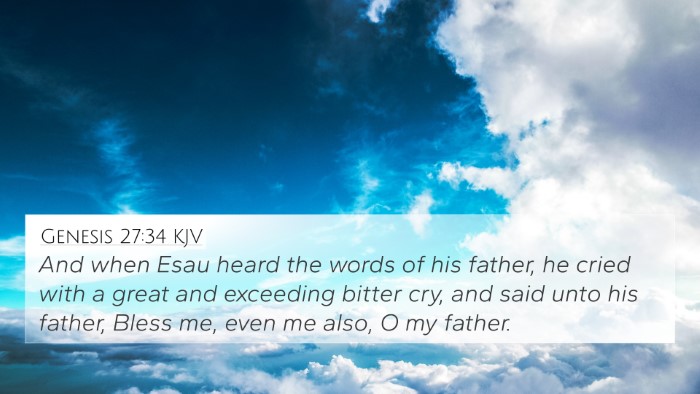Understanding Genesis 27:38
Genesis 27:38 records the emotional plea of Esau to his father, Isaac, after Jacob deceitfully received the blessing meant for him. This moment illustrates the depth of familial conflict and betrayal that emerges from the dynamics of favoritism and deception within the family of Isaac and Rebekah.
Verse Context
Genesis 27:38 states:
"And Esau said unto his father, Hast thou but one blessing, my father? bless me, even me also, O my father. And Esau lifted up his voice, and wept."
Meaning and Insights
This verse encapsulates several key themes and insights:
- Emotional Despair: Esau's anguish is palpable, showcasing the raw pain of having been wronged.
- Search for Blessing: Esau's cry reflects a desperate longing for paternal approval and blessing.
- The Nature of Blessing: The blessings pronounced by Isaac hold significant power, highlighting the gravity of familial words in ancient culture.
- Familial Conflict: The passage reveals the deep-seated conflicts that arise from favoritism and deceit within families.
- Divine Sovereignty: This moment serves to remind readers of God's overarching plan, as Jacob was meant to receive the blessing.
Commentary Highlights
Matthew Henry Commentary
Matthew Henry notes that Esau's reaction is indicative of his deeper feelings and the irreversible nature of the blessing that has been taken from him. His plea demonstrates the gravity of the situation, emphasizing the importance of parental blessings in the context of family dynamics.
Albert Barnes Commentary
Albert Barnes highlights the unique aspects of Esau’s character, asserting that the emotional intensity of his plea reveals the pain of rejection and loss. Barnes argues that this incident served as a significant turning point in the lives of both Esau and Jacob, cementing their destinies.
Adam Clarke Commentary
Adam Clarke emphasizes Esau's longing, interpreting it not merely as a search for material blessings but as a quest for love and acceptance. Clarke points to the familial relationships at play, suggesting that the fallout from Isaac's favoritism has long-lasting implications for both brothers.
Cross-References
Genesis 27:38 can be understood more fully when explored alongside several related scriptures:
- Genesis 25:34: The transaction where Jacob buys Esau’s birthright, illustrating the theme of deceit and loss.
- Genesis 27:1-4: Isaac's intention to bless Esau, highlighting the father's role in the conflict.
- Hebrews 12:16-17: A New Testament reflection on Esau's loss and his pursuit of the blessing.
- Malachi 1:2-3: God's declaration that He loved Jacob and hated Esau, cementing the divine election theme.
- Romans 9:13: An allusion to the same divine preference, further explaining God's sovereignty in blessing.
- Genesis 31:1-2: Jacob's treatment later highlights the continuing enmity and consequences of past decisions.
- Genesis 33:3-4: The eventual reconciliation between Jacob and Esau, showcasing the potential for healing despite conflict.
Implications of the Verse
The implications of Genesis 27:38 are vast and can pique interest in different theological and practical applications:
- Family Dynamics: How favoritism affects relationships within families.
- Consequences of Actions: The idea that deceit leads to long-term repercussions.
- Theological Reflection: The sovereignty of God in human affairs and choices.
Thematic Connections
There are significant thematic connections that one may explore within the Bible concerning Genesis 27:38:
- Redemption and Restoration: Continuing themes of reconciliation after conflict, seen in the story of Joseph and his brothers.
- Parental Influence: The role of parents in shaping the destinies of their children across various narratives.
- Identity and Heritage: Understanding how heritage impacts personal identity, reflected in various genealogical accounts.
Conclusion
Genesis 27:38 is a poignant verse that encapsulates the themes of loss, yearning, and familial conflict. By studying this scripture and its related verses, we can better understand the implications of our actions and the importance of blessing and acceptance within families. Through cross-referencing various Biblical texts, one can appreciate the rich narrative and thematic links throughout Scripture. Whether one is preparing a sermon or engaging in personal study, Genesis 27:38 offers profound insights that resonate through time.









